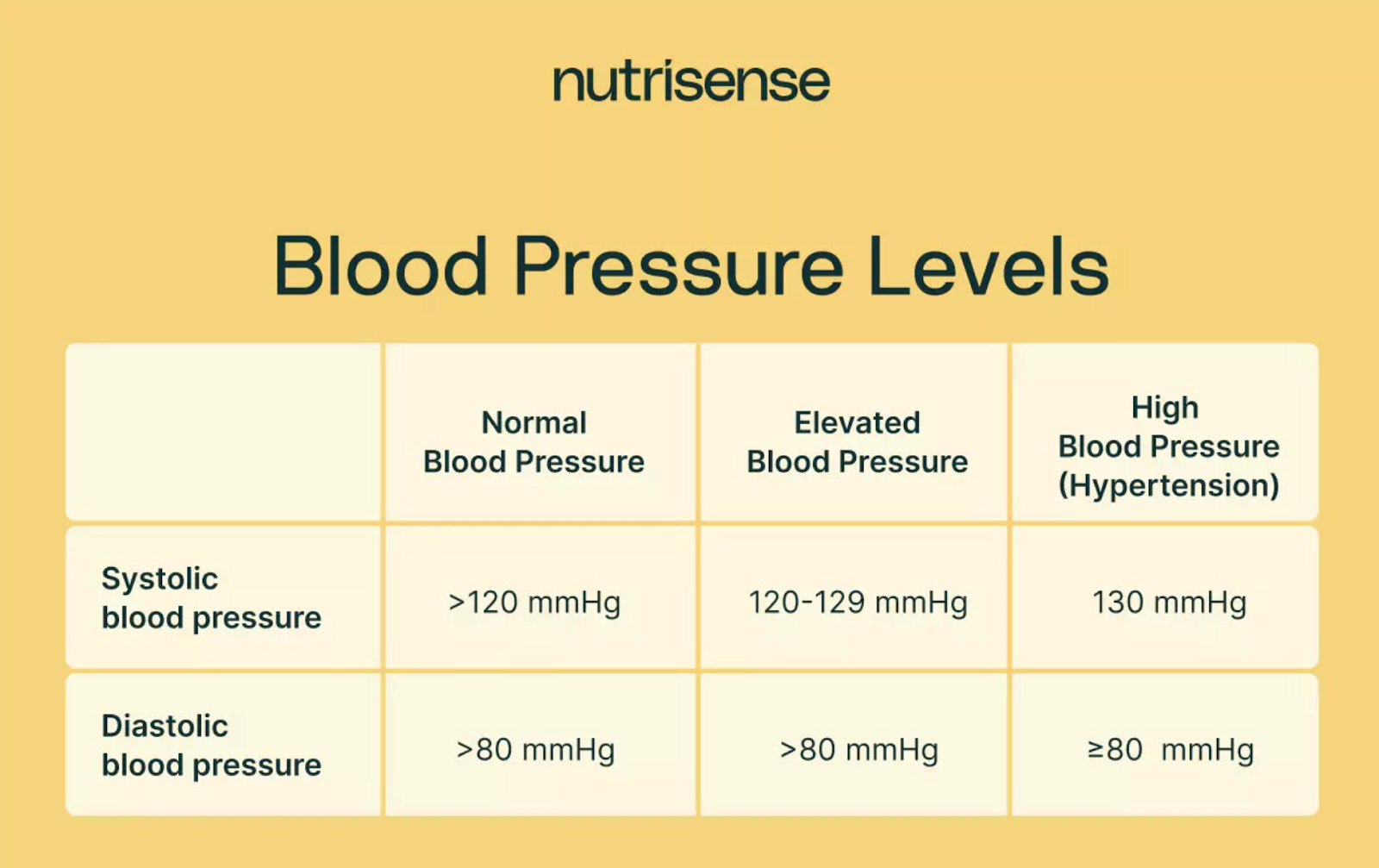Is Blood Pressure Higher in the Morning? 5 Causes of Morning Hypertension
.webp)
Key Takeaways
- Normal Range: Morning readings should ideally remain below 120/80 mmHg. Consistently seeing numbers higher than this upon waking may indicate morning hypertension.
- Circadian Influence: It is natural for levels to rise slightly before waking due to your body’s internal clock and cortisol release, but a significant morning surge outside of healthy limits may indicate cardiovascular risk.
- The Glucose Connection: Fluctuations in glucose and insulin sensitivity can directly impact vascular resistance and your blood pressure readings throughout the morning
- Human Oversight: Data alone provides the "what," but a Registered Dietitian helps you understand the "why" by interpreting how your unique lifestyle, stress, and sleep patterns impact these metrics.
- Normal Range: Morning readings should ideally remain below 120/80 mmHg. Consistently seeing numbers higher than this upon waking may indicate morning hypertension.
- Circadian Influence: It is natural for levels to rise slightly before waking due to your body’s internal clock and cortisol release, but a significant morning surge outside of healthy limits may indicate cardiovascular risk.
- The Glucose Connection: Fluctuations in glucose and insulin sensitivity can directly impact vascular resistance and your blood pressure readings throughout the morning
- Human Oversight: Data alone provides the "what," but a Registered Dietitian helps you understand the "why" by interpreting how your unique lifestyle, stress, and sleep patterns impact these metrics.
Did you know that high blood pressure, or hypertension, affects nearly half of all adults in the United States? Because blood pressure changes and fluctuates throughout the day, many believe that it’s normal to have higher blood pressure in the morning.
However, consistently high blood pressure can put you at risk for medical conditions like cardiovascular disease and stroke, so it's important to understand what a normal reading looks like and what factors can cause your blood pressure to rise.
So, is elevated morning BP normal? And how can you tell if your blood pressure is within a healthy range, or what your baseline should be? Read on to find out.
What is Blood Pressure?

Blood pressure is the force or pressure of blood pushing against the walls of your arteries, which are in charge of carrying blood from your heart to other parts of your body. Without blood pressure, oxygen and nutrients wouldn't be able to circulate throughout your body.
High blood pressure, or hypertension, occurs when there's a surge in blood pressure that is higher than normal. If your blood pressure is consistently high, your doctor may diagnose you with hypertension.
Hypertension (sometimes referred to as essential hypertension or primary hypertension), or even extreme fluctuations in your blood pressure, can have harmful effects on the body as it affects overall blood flow. Over time, it can cause serious damage to your arteries, your heart, your kidneys, and even your eyes. It's one of the biggest cardiovascular risk factors, and it increases your risk of heart failure and heart attack.
In addition, hypertension can increase your risk of stroke and cause a number of cerebrovascular diseases, such as dementia, Alzheimer's disease, overall cognitive functioning, and mental health. Therefore, it's crucial to monitor your blood pressure regularly and take steps to manage it if necessary.
Because high blood pressure may have no symptoms or warning signs, it's important to have your blood pressure checked by your doctor regularly.
How is Blood Pressure Measured?
Blood pressure is measured using two numbers: systolic and diastolic blood pressure.
- Systolic blood pressure measures how much pressure your blood is exerting against your artery walls when your heart beats.
- Diastolic blood pressure measures how much pressure your blood is exerting against your artery walls when your heart rests between beats.
Systolic blood pressure tends to rise steadily with age, while diastolic blood pressure can sometimes remain in the healthy range. This condition (known as isolated systolic hypertension) is the most prevalent in people over 50, and it can occur as plaque builds up in your blood vessels over time.
Your systolic and diastolic blood pressure levels are used to diagnose high blood pressure, but the guidelines can vary depending on your healthcare professional. You may be diagnosed with hypertension stage 1 if your blood pressure levels are consistently 130/80 mmHg or higher.
Hypertension stage 2, which is more severe, can be diagnosed if your blood pressure levels are consistently 140/90 mmHg or higher. Both an elevated systolic or diastolic blood pressure reading may be used to diagnose high blood pressure. Here are the standards for blood pressure levels, according to the American Heart Association:

Causes of High Blood Pressure
There are many causes of high blood pressure, including age, certain health conditions, and some prescription medications. Health conditions that may lead to high blood pressure include:
- Kidney disease or long-term kidney infections
- Diabetes
- Obstructive sleep apnea
- Hormone problems, including underactive or overactive thyroid or increased levels of certain hormones
- Lupus
Medications that may lead to high blood pressure include:
- Birth control pills
- Certain steroids
- Non-steroidal anti-inflammatory drugs (NSAIDS), like ibuprofen and naproxen
- Some serotonin-noradrenaline reuptake inhibitors (SSNRI), which are used to treat depression
Risk Factors For High Blood Pressure

You may be at higher risk for developing high blood pressure if you:
- Are at a weight that could be defined as obesity
- Consume excess sodium while being salt-sensitive
- Drink too much alcohol, coffee, or other caffeine-based drinks
- Don't get enough exercise and have low physical level levels
- Smoke cigarettes
- Are over the age of 65
- Have a family history of high blood pressure
- A racial or ethnic background associated with higher blood pressure risk
- Have irregular sleep patterns
- Experience/ have experienced blood clots
- Work at a shift job that disturbs your circadian rhythm (the 24-hour cycle of physical, mental, and behavioral changes that control your sleep patterns)
- Have low physical activity levels
Masked Hypertension Symptoms
Masked hypertension is a condition where an individual's blood pressure readings are normal when measured in a clinical setting but elevated when taken outside of this environment. This discrepancy can make it challenging to accurately diagnose and manage high blood pressure, leading to an increased risk of cardiovascular disease and stroke.
Symptoms of masked hypertension can be hard to spot, as many individuals with this condition may not exhibit any noticeable signs. In general, here are some common symptoms of high blood pressure:
- Severe headaches
- Dizziness
- Blurred vision
- Chest pain
- Shortness of breath
- Anxiety
- Nosebleeds
- Hearing buzzing sounds
- Confusion or brain fog
- Abnormal heart rhythm or heart rate
- Depression and other mood problem
- Feeling a thumping pulse in the neck
- Poor sleep quality
These symptoms can also be caused by other health conditions, so it's important to consult with a doctor if you experience any of them. Additionally, maintaining regular check-ups and monitoring your blood pressure at home can help identify masked hypertension early on.
Why is My Blood Pressure Higher in the Morning?
Blood pressure naturally rises in the morning as part of your circadian rhythm, but it should stay within a healthy range. While it's true that blood pressure follows a daily pattern, this physiological shift—often influenced by glucose and cortisol—should not result in morning hypertension. Consistently high morning readings are linked to an increased risk of heart disease and stroke.
This morning surge is often why most major cardiovascular events occur in the early hours. Because your vascular health is tied to metabolic stability, it's vital to track if your blood pressure is impacted by glucose variability. If your readings are consistently high, consult a healthcare professional and consider how a Nutrisense Registered Dietitian can help you interpret these daily trends.
The Metabolic Link: Glucose and Morning Spikes
Many people experience a "morning surge" that correlates with the Dawn Phenomenon—a natural rise in glucose levels before waking. When your metabolic health is compromised, these glucose fluctuations can contribute to increased arterial pressure. Working with a Nutrisense professional can help you identify if your morning blood pressure is an isolated event or part of a broader metabolic pattern.
Monitoring Your Blood Pressure at Home

To monitor your blood pressure at home using a blood pressure cuff, the American Heart Association has these tips:
- Rest for at least five minutes before taking your blood pressure measurements. Make sure your bladder is empty and don't smoke, drink caffeinated drinks, or exercise within 30 minutes before measuring.
- Sit upright with your back straight, feet flat on the floor, and make sure your legs aren't crossed. Your arm should be supported on a flat surface, like a table, with your upper arm at heart level.
- Place the cuff directly on your skin and make sure it is sitting right above the bend of your elbow. Follow the instructions on your blood pressure cuff to make sure you're doing it properly.
- Measure your blood pressure at the same time every day. Blood pressure follows a daily pattern, so measuring at the same time every day will give you an accurate reading.
- Take multiple readings and record the results. When you measure, take two or three readings one minute apart and write down your results.
A diagnosis of high blood pressure should be confirmed by your doctor or healthcare provider. If you have concerns, you may want to bring your readings to an appointment to be evaluated.
Other Types of Tests for Hypertension Diagnosis
In addition to the standard blood pressure measurements, there are other types of tests that healthcare professionals might use to get a more comprehensive understanding of your blood pressure levels over time.
- Ambulatory Blood Pressure Monitoring (ABPM) involves wearing a blood pressure cuff for 24 hours. This type of monitoring provides a detailed record of your blood pressure throughout the daily 24-hour activity cycle, capturing variations that might not be apparent in a single office visit.
- Lab tests, such as urine and blood tests, can help identify any underlying conditions that may be contributing to high blood pressure.
- Echocardiogram is an ultrasound of the heart that can detect any abnormalities in the heart's structure or function due to high blood pressure.
- Electrocardiogram (ECG) measures the electrical activity of your heart and can help identify any irregularities in heart rhythm that may be caused by high blood pressure.
- Heart stress tests can assess how well your heart functions under physical stress. This test may be recommended if you've confirmed hypertension and are experiencing symptoms of chest pain or shortness of breath. Elderly patients may also undergo a stress test to determine their overall fitness level and cardiovascular risk.
These additional tests can provide valuable information for your healthcare professional to make a proper diagnosis and develop an appropriate treatment plan.
What if You Have a High Blood Pressure Reading?

It's important to remember that a single high morning blood pressure reading isn't an immediate cause for alarm. If your reading is slightly or moderately higher than usual, take your blood pressure a few more times and talk to your doctor or a medical professional.
If your blood pressure exceeds 180/120 mmHg, test again after five minutes. If it's still unusually high after the second reading, and you experience chest pain, shortness of breath, back pain, numbness or weakness, or changes in vision, don't wait to see if your pressure comes down on its own. If this is accompanied by any chest pain, it’s a good idea to seek immediate medical attention.
A blood pressure reading above this amount might indicate a hypertensive crisis, which is when blood pressure quickly rises to 180/120 mmHg or higher. A hypertensive crisis can have serious consequences, including heart attack or stroke, so seek care right away.
What Should You Do If You Consistently Have High Blood Pressure Measurements?
Understandably, consistently having high blood pressure measurements can be a risk. If you notice your measurements are constantly elevated or keep rising over time, it's important to seek medical advice as soon as possible.
Your doctor or healthcare professional will provide further diagnosis of hypertension to make sure any other underlying health problems are addressed. They may refer you to a specialist if they suspect secondary hypertension, which means the increase in blood pressure is caused by an underlying condition such as hypoglycemia, kidney disease, thyroid problems, or sleep apnea, or something else.
Do You Need Medication to Treat Hypertension?
Whether you need medication to treat hypertension depends on the levels of blood pressure surge you are experiencing and other underlying health conditions. If you are diagnosed with hypertension, your doctor will consider a range of factors to determine the best course of action, including age, overall health, medical history, and risk factors.
In some cases, lifestyle changes such as dietary changes and increasing physical activity may be enough to lower blood pressure levels. In others, a combination of antihypertensive medication and lifestyle changes may be recommended. Your doctor or healthcare professional will work with you to develop an individualized treatment plan that fits your specific needs.
As with all hypertensive patients, you should make more regular visits to your healthcare provider to monitor your blood pressure and adjust the treatment plan if needed. It's essential to continue monitoring your blood pressure at home as well, as it can provide valuable information about how your body responds to different activities and treatments.
If you experience severe headache, nausea, vomiting, dizziness, shortness of breath, rapid heart rate, or chest pain along with high blood pressure measurements, it's important to seek medical attention immediately. These symptoms may indicate a hypertensive emergency and require immediate care to prevent serious complications.
Tips to Prevent High Blood Pressure
High blood pressure is a serious medical issue, but there are a few lifestyle factors you can implement to prevent it apart from taking blood pressure medications.
Eat a Healthy Diet
Focusing on healthy foods rich in potassium, fiber, and protein and avoiding foods high in added sugars, and saturated fats may help you keep your blood pressure low.
Limiting salt if you are salt-sensitive may also be helpful, though there is controversy surrounding advice on sodium reduction and whether it should be restricted to people with hypertension or applied population-wide.
For some people, it may also be a good idea to avoid sodium intake dropping too low. Some studies show an increase in stroke at low sodium levels, and that sodium response follows a J-shaped curve, where very low and very high intakes may both be detrimental.
The Dietary Approach to Stop Hypertension (DASH) eating plan advises the following:
- Eating vegetables, fruits, whole grains, fat-free or low-fat dairy products, fish, poultry, beans, and nuts/seeds.
- Limiting foods high in saturated fats, including fatty meats, coconut oil, and palm oil.
- Limiting sugar-sweetened beverages and sweets.
Maintain a Healthy Weight
Being overweight or obese can increase your risk of high blood pressure. The CDC suggests getting at least seven hours of sleep a night, prioritizing a diet full of nutrient-rich foods. Getting regular physical activity alongside a healthy diet can help you maintain your weight and has many other health benefits too.
Stay Physically Active

Physical activity has been shown to help lower blood pressure. Aim to get at least two and a half hours of moderate-intensity exercise, like walking or bicycling, per week.
Get Enough Sleep
Sleep deficiency is linked to high blood pressure. Experts recommend that adults get at least seven hours of sleep a night. There are a few things you can do that might improve your sleep, including:
- Going to bed and waking up around the same time every day, even on weekends
- Keeping the room where you sleep dark, quiet, relaxing, and cool
- Keeping a consistent bedtime routine that doesn't include screens, like showering, reading, or journaling before bed
Limit Your Alcohol Intake

Drinking too much alcohol can negatively impact your blood pressure. Men are advised to limit their alcohol intake to no more than two alcoholic drinks per day, while women are advised to stick to one alcoholic drink per day.
Find the right Nutrisense programto turn insight into progress.
Turn Your Glucose Readings Into Actionable Insights with Nutrisense
Tracking your glucose levels is only the first step—understanding what they mean and how to act on them is what truly transforms your health. That’s where Nutrisense stands out, whether you’re already using a CGM or glucose biosensor, or need expert guidance and an app to help you track your health goals.
Unlike other programs and apps that leave you guessing, when you join the Nutrisense program, you also get the option to work with our diverse team of experts via insurance-covered video calls! Our team of glucose-trained dietitians and nutritionists help you make sense of your data, personalize your nutrition, and more, so you know which glucose spikes actually matter and how to adjust your habits for better health. Start with our quiz to see how Nutrisense can support your health.
Frequently Asked Questions About Morning Hypertension
What is a normal blood pressure reading in the morning?
A healthy morning reading is typically below 120/80 mmHg. Consistently higher readings may suggest morning hypertension.
What are the symptoms of a morning blood pressure spike?
Morning hypertension is often "silent," but some may experience headaches, dizziness, or blurred vision shortly after waking. Monitoring your data is the only way to know for sure.
Why is my blood pressure high in the morning but normal at night?
This is often due to the "morning surge" or circadian rhythm. However, it can also be exacerbated by sleep apnea, high sodium intake the night before, or glucose variability.
How can I lower my blood pressure in the morning?
Focus on metabolic flexibility: maintain a consistent sleep schedule, limit late-night carbohydrates to stabilize glucose, and practice stress-reduction techniques before bed.
When is the best time to take blood pressure for accuracy?
Measure your pressure twice: once in the morning (before food or meds) and once in the evening. This helps your dietitian or doctor see the full daily trend.
Go Beyond Glucose Data with Nutrisense
Your glucose can significantly impact how your body feels and functions. That’s why stable levels are an important factor in supporting overall wellbeing. But viewing glucose isn't enough. Nutrisense, you’ll be able to learn how to use your body's data to make informed lifestyle choices that support healthy living.
One-to-one coaching
Sign up to access insurance-covered video calls to work with a glucose expert: a personal registered dietitian or certified nutritionist who will help tailor your lifestyle and diet to your goals.
Monitor and measure what matters
With the Nutrisense CGM Program, you can monitor your glucose with health tech like glucose biosensors and continuous glucose monitor (CGM)s, and analyze the trends over time with the Nutrisense App. This will help you make the most informed choices about the foods you consume and their impact on your health.
Find your best fit
Ready to take the first step? Start with our quiz to find the right Nutrisense program to help you take control.

Amanda is a Nutrition Manager and Registered Dietitian, with a Masters in Dietetics from Stephen F. Austin State University. Originally from south GA, she got her undergrad degree from Texas Tech University. She worked at a hospital in Fort Worth, TX, for 4 years as a dietitian, counseling those living with HIV.




